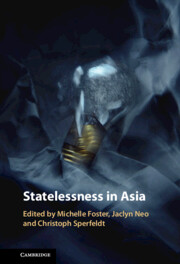Book contents
- Statelessness in Asia
- Statelessness in Asia
- Copyright page
- Contents
- Editor Bios
- Contributors
- Acknowledgements
- Notes on the Cover Image
- Abbreviations
- 1 Statelessness in Asia
- Part I Asia and the Phenomenon of Statelessness
- Part II Statelessness and Intersecting Vulnerabilities
- 6 Learning to Be Stateless
- 7 Gender, Nationality and Statelessness
- 8 Doubtful Citizens
- 9 Statelessness and Heritagization in Southeast Asia
- Part III Challenges and Prospects for Change
- Table of Legislation
- Table of Treaties
- Index
9 - Statelessness and Heritagization in Southeast Asia
Cultural Tourism, Festivals and the Marginalization of Trans-border Mobile Maritime Communities
from Part II - Statelessness and Intersecting Vulnerabilities
Published online by Cambridge University Press: 19 December 2024
- Statelessness in Asia
- Statelessness in Asia
- Copyright page
- Contents
- Editor Bios
- Contributors
- Acknowledgements
- Notes on the Cover Image
- Abbreviations
- 1 Statelessness in Asia
- Part I Asia and the Phenomenon of Statelessness
- Part II Statelessness and Intersecting Vulnerabilities
- 6 Learning to Be Stateless
- 7 Gender, Nationality and Statelessness
- 8 Doubtful Citizens
- 9 Statelessness and Heritagization in Southeast Asia
- Part III Challenges and Prospects for Change
- Table of Legislation
- Table of Treaties
- Index
Summary
The classification of natural spaces and cultural practices as ‘heritage’ profoundly alters their form and function. Individuals and communities responsible for maintaining the space or practice are often subjected to the dictates of governments, non-governmental institutions and tourists’ tastes, whilst the symbols of heritage themselves are projected as emblematic of how the state wishes itself to be perceived. The condition of statelessness magnifies the vulnerability of communities to these processes of heritagization, with the state co-opting cultural attributes into icons of heritage without any prospect of redress and exacerbating the invisibility and relative lack of agency that characterize many stateless communities. This chapter explores these issues in the context of mobile maritime communities that are stateless or at risk of statelessness in Southeast Asia. It demonstrates how states such as Malaysia, Thailand and Myanmar have introduced restrictions on everyday livelihood practices through the imposition of marine protected areas and transformed other aspects of these communities’ lives, such as their houseboats, into objects of touristic consumption under the aegis of natural, cultural and intangible ‘heritage’ that serve to benefit the state yet further degrade the human rights of individuals in the affected communities.
Information
- Type
- Chapter
- Information
- Statelessness in Asia , pp. 231 - 258Publisher: Cambridge University PressPrint publication year: 2025
